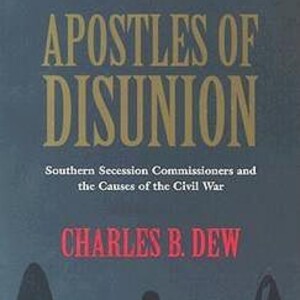
Tuesday Mar 11, 2025
Apostles of Disunion: Examining Southern Secession and Justification
1 What's Apostles of Disunion
"Apostles of Disunion" by Charles B. Dew explores the ideology and motivations behind the secession of Southern states from the Union during the American Civil War. The book delves into the writings and speeches of Southern leaders and politicians, revealing that racism and the defense of slavery were central to their arguments for disunion. Dew argues that the secessionist movement was driven not just by a desire for states' rights, but fundamentally by the need to preserve and protect the institution of slavery, exposing the deep social and political divides that fueled the conflict and underscoring the enduring legacy of these beliefs in American society.
2 Key Concepts of Apostles of Disunion
In Chapter 1 of "Apostles of Disunion" by Charles B. Dew, the theme revolves around the motivations and ideologies behind the southern states' secession from the Union. This theme resonates throughout several chapters of the book, particularly in Chapters 2 and 3, where Dew examines the rhetoric of secessionists and the influence of slavery as a central issue. Additionally, Chapter 5 further explores how the fear of losing the institution of slavery drove many southerners to support secession, reinforcing the foundational ideas established in the first chapter. Together, these chapters create a cohesive narrative that delves into the complex societal and political factors that fueled the drive for disunion.
3 In-Depth Chapter Analysis of Apostles of Disunion by Charles B. Dew
In "Apostles of Disunion," Charles B. Dew explores the myriad factors leading to the Confederacy's formation and the ideological underpinnings of secession. The opening chapters establish the significance of Southern leaders’ perspectives on slavery, linking their arguments directly to their fears of a Northern-dominated federal government undermining their "peculiar institution." For instance, Chapter 2 delves into the rhetoric from Southern politicians, like Jefferson Davis, who framed secession not merely as a political act but as a defense of the Southern way of life, highlighting how crucial the preservation of slavery was to their identity and motivation. This chapter emphasizes the theme of Southern nationalism, illustrating how deeply intertwined the notions of state sovereignty and slavery were.
Later chapters, particularly Chapter 4, broaden the discussion to include how fear of abolitionism galvanized support for secession among the Southern populace. Dew recounts the impact of the 1857 Dred Scott decision and its aftermath, emphasizing the perception among white Southerners that their social and economic futures were at stake. This chapter demonstrates how Southern leaders crafted a narrative of impending apocalypse should slavery be curtailed, thus utilizing fear to solidify their cause. By the end of the text, Dew artfully depicts how these contrasting visions of America—not just regional differences but foundational ideological divides—culminated in the Civil War, reinforcing the theme that the fight over slavery was not merely a political disagreement but a deep-seated struggle for societal identity.
Book Summary Audio https://www.bookey.app/audiobook/apostles-of-disunion
Youtube https://www.youtube.com/watch?v=7lKuZJC8KMs
Amazon https://www.amazon.com/Apostles-Disunion-Southern-Secession-Commissioners/dp/081392104X
Goodreads https://www.goodreads.com/book/show/1054644.Apostles_of_Disunion
No comments yet. Be the first to say something!